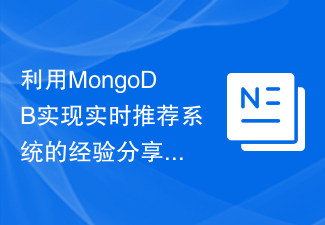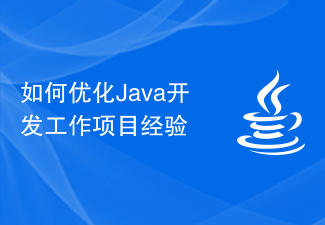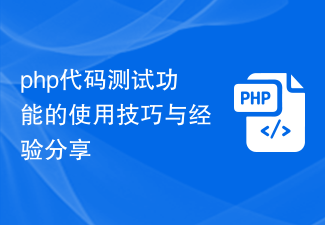 Backend Development
Backend Development Python Tutorial
Python Tutorial Python development experience sharing: solving common development problems
Python development experience sharing: solving common development problems
As a simple and elegant programming language, Python is widely used in software development, data analysis, artificial intelligence and other fields. In the process of Python development, we often encounter some problems. This article will share my experience in the Python development process to help everyone better solve these common development problems.
1. Module import issues
In Python development, we often use various third-party libraries. However, sometimes the libraries we import cannot be used normally, and an error message indicates that the module does not exist. At this time we need to check whether the required modules have been installed correctly and check whether the path is correct.
If you find that the module does not exist, you can install it through pip install moduleName to ensure that the installed module version is consistent with the required version. In addition, some modules cannot be imported because they have the same name as the modules that come with Python. You can try to modify the module name or use a different interpreter environment.
2. Code performance optimization
In program development, we often need to consider code performance issues, especially when processing large-scale data. Common performance optimization tips include the following:
- Use appropriate data structures: Choosing appropriate data structures can improve the running efficiency of the code. For example, use dictionaries instead of lists for search operations, use sets for deduplication operations, etc.
- Reduce loop nesting: Too much loop nesting will lead to longer code execution time, so it is necessary to reduce the number of loop nesting levels as much as possible.
- Use generators and iterators: Generators and iterators can reduce memory usage and improve code execution efficiency.
- Cache calculation results: If a calculation result is the same in multiple loops, the result can be cached to avoid repeated calculations.
- Parallel computing: For some computing-intensive tasks, you can consider using multi-threads or multi-processes for parallel computing to speed up program execution.
3. Exception handling
In actual development, we often encounter various abnormal situations, such as file read and write errors, network connection errors, etc. At this time, we need to use the exception handling mechanism to Catch and handle these exceptions. Common exception handling methods include the following:
- try-except block: Use try-except block to catch exceptions and handle them. In the except block, corresponding processing operations can be performed according to the specific exception type to ensure that the program does not crash due to exceptions.
- Inheritance relationship of exceptions: When handling exceptions, you can use the inheritance relationship of exceptions to catch multiple exceptions. Catching exceptions in order from specific to general can improve the readability and maintainability of the code.
- Finally block: The code in the finally block will be executed regardless of whether an exception occurs after the code in the try block is executed, and can be used for cleanup operations such as resource release.
4. Performance Analysis and Debugging
During the Python development process, we often need to perform performance analysis and debugging of the code to solve some problems. Common performance analysis and debugging tools include the following:
- timeit module: The timeit module is a tool that comes with Python for measuring the execution time of small pieces of code.
- cProfile module: The cProfile module is a module that comes with Python for performance analysis. It can help us find performance bottlenecks in the code.
- pdb module: The pdb module is a module that comes with Python for debugging. It can help us find bugs in the code by setting breakpoints, single-step debugging and other functions.
5. Documentation and comments
During the development process, good documentation and comments are very important. Good documentation can help other developers better understand and use your code, and comments can help yourself and others better understand the logic of the code. Therefore, when writing code, develop the habit of writing documentation and comments.
6. Team collaboration
In actual development, it is very common for multiple people to cooperate in development. You need to pay attention to the following points during team collaboration:
- Use version control tools: Version control tools can help team members collaborate on development and manage code versions.
- Adhere to code specifications: Team members should follow unified code specifications to improve the readability and maintainability of the code.
- Adequate communication: Team members should maintain good communication among themselves and coordinate and solve problems in a timely manner.
Summary
This article shares my experience in solving common development problems during Python development. In actual development, don't panic when you encounter problems, be good at consulting documents and information, and actively try different solutions. I believe that through continuous learning and practice, everyone can become an excellent Python developer.
The above is the detailed content of Python development experience sharing: solving common development problems. For more information, please follow other related articles on the PHP Chinese website!
 利用MongoDB实现实时推荐系统的经验分享Nov 03, 2023 pm 04:37 PM
利用MongoDB实现实时推荐系统的经验分享Nov 03, 2023 pm 04:37 PM随着互联网的发展,人们的生活越来越数字化,个性化需求也越来越强烈。在这个信息爆炸的时代,用户往往面对海量的信息无从选择,所以实时推荐系统的重要性愈发凸显出来。本文将分享利用MongoDB实现实时推荐系统的经验,希望能为开发者们提供一些启发和帮助。一、MongoDB简介MongoDB是一个开源的NoSQL数据库,它以高性能、易扩展和灵活的数据模型而闻名。相比传
 C#开发经验分享:高效编程技巧与实践Nov 23, 2023 am 09:10 AM
C#开发经验分享:高效编程技巧与实践Nov 23, 2023 am 09:10 AMC#开发经验分享:高效编程技巧与实践在现代软件开发领域,C#已经成为了广受欢迎的编程语言之一。作为一门面向对象的语言,C#可以用于开发各种类型的应用程序,包括桌面应用程序、Web应用程序和移动应用程序等等。然而,开发一个高效的应用程序并不仅仅只是使用正确的语法和库函数,还需要遵循一些编程技巧和实践,以提高代码的可读性和可维护性。在本文中,我将分享一些C#编程
 如何优化Java开发工作项目经验Nov 02, 2023 am 09:47 AM
如何优化Java开发工作项目经验Nov 02, 2023 am 09:47 AMJava开发是当今世界上最流行的编程语言之一,随着越来越多的公司和组织使用Java进行应用程序开发,Java开发人员的数量也在不断增加。然而,Java开发者可能会面临一些常见问题,例如重复代码、缺乏文档、低效的开发流程等。在这篇文章中,我们将探讨一些优化Java开发工作项目经验的方法。使用设计模式使用设计模式可以避免代码的重复和不必要的复杂性,同时提高代码的
 Go语言开发工作项目经验分享Nov 02, 2023 am 09:14 AM
Go语言开发工作项目经验分享Nov 02, 2023 am 09:14 AM随着互联网的发展,计算机科学领域也迎来了许多全新的编程语言。其中,Go语言以其并发性和简洁的语法,逐渐成为许多开发者的首选。作为一名从事软件开发的工程师,我有幸参与了一个基于Go语言的工作项目,并在这个过程中积累了一些宝贵的经验和教训。首先,选择适合的框架和库是至关重要的。在开始项目之前,我们进行了详细的调研,尝试了不同的框架和库,最终选择了Gin框架作为我
 Git分支管理策略实践经验分享Nov 04, 2023 am 10:39 AM
Git分支管理策略实践经验分享Nov 04, 2023 am 10:39 AMGit分支管理是开发团队中非常重要的一项工作,良好的分支管理策略可以有效提升团队的代码管理效率和开发流程。本文将分享一些实践经验,帮助读者更好地理解和应用Git分支管理策略。一、Git分支管理的重要性Git是目前最流行的分布式版本控制系统,它提供了强大的分支管理能力。通过合理的分支管理策略,可以实现同时进行多个功能开发、修复bug、发布版本等工作,避免不同开
 分享优化和经验- Golang队列的实现方法Jan 24, 2024 am 09:43 AM
分享优化和经验- Golang队列的实现方法Jan 24, 2024 am 09:43 AMGolang队列实现的优化技巧与经验分享在Golang中,队列是一种常用的数据结构,可以实现先进先出(FIFO)的数据管理。虽然Golang已经提供了队列的标准库实现(container/list),但是在某些情况下,我们可能需要根据实际需求对队列进行一些优化。本文将分享一些优化技巧和经验,帮助你更好地使用Golang队列。一、选择适合场景的队列实现在Gol
 php代码测试功能的使用技巧与经验分享Aug 10, 2023 am 09:25 AM
php代码测试功能的使用技巧与经验分享Aug 10, 2023 am 09:25 AMPHP代码测试功能的使用技巧与经验分享在开发PHP应用程序时,代码测试是非常重要的环节。通过代码测试可以检查和验证代码的正确性,确保程序的稳定运行。本文将介绍一些PHP代码测试的使用技巧和经验,帮助开发人员更好地进行代码测试。使用单元测试框架单元测试是针对程序中各个独立功能模块进行的测试。使用单元测试框架可以简化测试过程,并提供一些强大的断言和测试结果报告生
 Vue开发经验分享:如何处理复杂的表单验证Nov 02, 2023 pm 12:40 PM
Vue开发经验分享:如何处理复杂的表单验证Nov 02, 2023 pm 12:40 PMVue开发经验分享:如何处理复杂的表单验证引言:在Vue开发中,表单验证是一个非常重要且常见的需求,特别是在处理复杂表单时。本文将分享一些处理复杂表单验证的经验,希望能帮助读者更好地应对这一挑战。一、表单验证的重要性表单验证是保证数据的有效性和完整性的关键步骤。通过对用户输入进行验证,可以减少错误数据的产生,提高数据的准确性和可靠性。尤其是在处理敏感信息或对


Hot AI Tools

Undresser.AI Undress
AI-powered app for creating realistic nude photos

AI Clothes Remover
Online AI tool for removing clothes from photos.

Undress AI Tool
Undress images for free

Clothoff.io
AI clothes remover

AI Hentai Generator
Generate AI Hentai for free.

Hot Article

Hot Tools

Dreamweaver Mac version
Visual web development tools

MantisBT
Mantis is an easy-to-deploy web-based defect tracking tool designed to aid in product defect tracking. It requires PHP, MySQL and a web server. Check out our demo and hosting services.

Notepad++7.3.1
Easy-to-use and free code editor

SAP NetWeaver Server Adapter for Eclipse
Integrate Eclipse with SAP NetWeaver application server.

SublimeText3 Mac version
God-level code editing software (SublimeText3)





